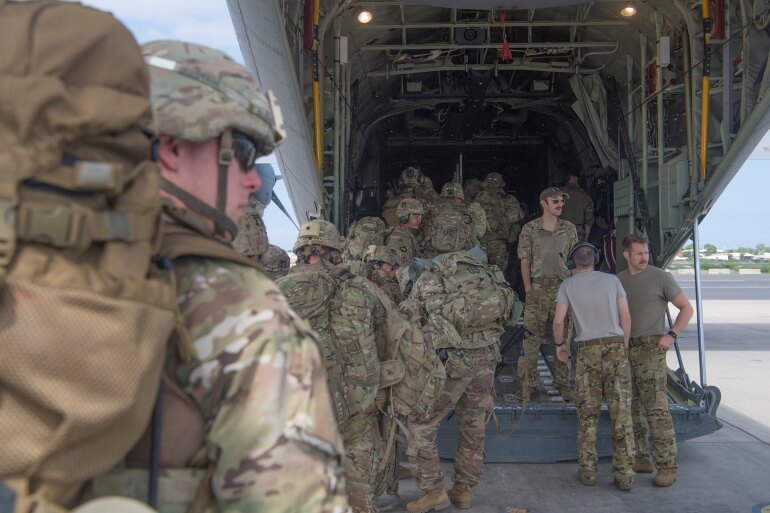Reversing former United States (US) Donald Trump’s order to withdraw around 700 troops from Somalia in December 2020, the Pentagon announced on Monday that President Joe Biden has authorised the redeployment of a “small, persistent” US military presence to the Horn of Africa country to counter Al Qaeda-linked terror group Al-Shabab.
According to Pentagon spokesman John Kirby, the decision was made at the request of US Secretary of Defense Lloyd Austin, along with other senior US commanders, who felt that the episodic engagement model “was inefficient and increasingly unsustainable” and posed an additional risk to US troops, who had been “deploying in and out of Somalia […] for the past 16 months.”
Somalia "elected" a new president yesterday. Today, the US announced a hundreds strong troop deployment into Somalia.
— Jordan Schachtel @ dossier.substack.com (@JordanSchachtel) May 16, 2022
Surely, those two things are not at all related.
The special military operations personnel will be repositioned from elsewhere in Africa and continue to engage in training, assisting, and equipping their partner forces to “disrupt, degrade and monitor Al Shabab.” “Our forces are not now, nor will they be directly engaged in combat operations,” Kirby added.
US National Security Council spokeswoman Adrienne Watson admitted that Biden agreed to sign off on the proposal early this month, though she did not reveal the number of troops that will be deployed. Nevertheless, a senior US administration official, speaking on condition of anonymity, said that it would be “under 500.”
Additionally, three senior US administration officials confirmed to The New York Times that Biden had approved a Pentagon request for “standing authority” to target about a dozen suspected Al Shabab leaders. Since taking office, the Biden administration has limited the military’s capability to launch drone strikes outside active war zones and requires strikes to be authorised by the White House. However, in July last year, the US Africa Command (Africom) stated that a single strike was carried out in Galkayo in coordination with the Federal Government of Somalia, targeting Al-Shabab terrorists in Somalia for the first time in nearly six months.
Al Shabab, or ‘the youth,’ was formed in the early 2000s to establish an Islamic state in Somalia. The group has carried out hundreds of deadly attacks, including suicide bombings, in Somalia, Kenya, and Uganda, killing more than 4,000 civilians over the last ten years. Earlier this month, Al-Shabab, which opposes foreign presence in the country, took responsibility for an attack on El Baraf, about 150 kilometres from the capital Mogadishu, in which 10 Burundian peacekeepers were killed.
The terrorist group has increased its attacks and killed over a dozen Americans, including three at a US military base in Kenya in 2020. “We have seen, regrettably, clear evidence that Al Shabab has the intent and capability to target Americans,” another US official noted.
A day after new Somalia President that many Somalis decry is a known oppressive US puppet… Biden set to deploy hundreds of US troops to Somalia, reversing Trump withdrawal. #NoMore pic.twitter.com/RqRxVxUA9b
— hermela aregawi (@HermelaTV) May 16, 2022
In light of the political turmoil in Somalia, Al Shabab has become stronger by making inroads once again after being pushed back by the African Union Mission in Somalia (Amisom) to the remote parts of the country. However, Amisom’s mandate came to an end in March 2022 after 15 years; it transferred all powers to the Somali government and transitioned to African Transition Mission in Somalia (ATMIS), which has soldiers from Burundi, Uganda, Kenya, Ethiopia, and Djibouti.
Therefore, it poses a significant challenge to newly-elected President Hassan Sheikh Mohamud as he takes over from Mohamed Abdullahi Mohamed Farmaajo after a long-delayed election this Sunday.
While congratulating Mohamud on Monday, White House Press Secretary Karine-Jean Pierre said, “We encourage their new president and all the Somalian leaders to prioritise strengthening democratic governance and institutions, developing security forces to defeat terrorism, enacting economic reforms, and facilitating the delivery of humanitarian aid to the millions of Somalia’s — Somalis suffering from devastating drought.”
Congratulations to the people of Somalia on the successful completion of their presidential election on May 15, and to @HassanSMohamud on his victory. The country's leaders now can focus on reforms to achieve our shared goal of a peaceful and prosperous Somalia.
— Secretary Antony Blinken (@SecBlinken) May 17, 2022
Meanwhile, the US’ latest move was received well by Somalian officials. “It’s good news to have U.S. troops on the ground and counterterrorism efforts can be reinitiated,” Colonel Ahmed Sheikh, the former commander of Somalia’s elite Danab Special Forces unit, trained by US troops, told Reuters.

